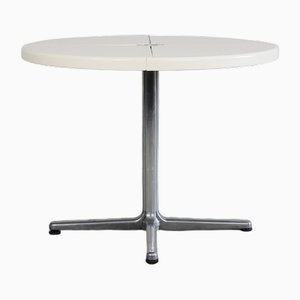
Italian interior and industrial designer Giancarlo Piretti was born in 1940 in Bologna. He obtained his teaching degree in drawing at the Art Institute of Bologna (dates unknown), and continued his studies at the Academy of Fine Arts in Bologna in 1960. From 1963 until 1970, he taught interior design at the Art Institute of Bologna.
Sometime in the 1960s, Piretti also joined Italian design company Castelli as an interior designer, creating home furniture and office furnishings. During his twelve years at Castelli, Piretti obtained numerous industrial patents for his designs, which were mostly chairs. Piretti’s work for Castelli garnered the company an international reputation in furniture design. His most well-known design is the plastic folding Plia Chair (1968), which has sold over seven million copies since 1969 and is still in production. It won the BIO 5 distinction and the SMAU prize at the Ljubljana Biennial in 1971, Germany’s Gute Form prize in 1973, and can be found in permanent collections in various museums world-wide, including Austria, Czech Republic, Slovenia and the United States. In 1969 the complementary Plia Table was equally well-received in design circles, these revolutionary designs measured just 5 cm in depth when folded, a marvel in the 1960s.
In the late-1970s, Piretti worked with Argentine architect-designer Emilio Ambasz (b. 1943) on several award-winning designs, including the two ergonomic seating systems Vertebra (1975, winner of the Smau Industrial Design Award in 1979) and Dorsal (1981). From 1984 to 1986 Piretti worked for Castilia, a firm that was part of the Castelli group, that specialized in the production of home furniture characterized by functional and aesthetic systems.
In 1988, Piretti revealed The Piretti Collection in Chicago, which included over 50 different office chairs and seating styles. It is still manufactured by various licensees around the world. The collection, which has won several prizes including the UBD, the ASID, the Compasso d'Oro and the G-Mark, was designed to respond to the specific needs of each individual user. In 1997, the collection reached the milestone of one million chairs sold. Today, they have sold more than two-and-a-half million pieces from the collection.
Other well-known design include the DCS 106 Stacking Chair (1965); Plona Lounge Chair (1969); Alky Chair (1970s); Plantone Folding Desk (1970); Plano (1971, Gold Medal IBD); Planto Coat Rack (1972); the System 61 modular sofa system (1973); Xylon Chair (1992, two G Mark Awards 1994); and the Torsion Seating Collection (1995-6, G Mark Award 1997).
Today, Piretti lives and works in Bologna with his son, designer Alessandro Piretti.

